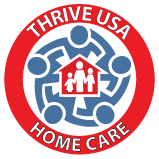What’s the Difference Between Companion Care and Personal Care?
You’ve probably heard of “personal care” and “companion care” if you’re looking for non-medical home care for a loved one. Although they may share similarities, many people mistakenly use these names interchangeably. They are, however, not the same. You may choose the best in-home care assistance for your loved ones by being aware of the definitions and advantages of personal care and companion care. This article will help you differentiate between the two and help you understand which one you need.
What is Personal Care?
Personal care is intended for seniors who require assistance with daily living tasks (ADLs). Help with bathing, eating, dressing, getting in and out of a chair or bed, using the restroom, and other activities that need physical contact are examples of the support that may be provided. Personal care requires more time and effort than companion care. Because it entails more hands-on help as your loved one goes about her day and more direct interaction with you, personal care is more involved than companion care. A senior’s health is also monitored by personal caregivers through the taking of vital signs like blood pressure and temperature. Also, they can deliver medications when necessary and, if needed, remind patients when it’s time to take them. They can also drive clients to medical appointments or run errands. The goal of personal caregivers is to ensure seniors have the proper support they need to remain safe and independent in their own homes.
What is Companion Care?
Companion care is intended to offer companionship services as well as assistance with simple housekeeping activities including laundry, changing sheets, vacuuming, light dusting, and mopping floors. The emphasis is on assisting seniors to maintain their independence and self-reliance in their own homes or apartments. Also, companions can help with activities like grocery shopping or driving a senior to social gatherings like church events or family outings. Also, companions offer conversation and emotional support to seniors who feel lonely as a result of decreased mobility, bereavement, or other aging-related life changes.

How to Choose the Best Option for Your Loved One
Although both companion care and personal care offer important services that help seniors preserve their independence, their purposes are distinct. The main goals of companion care are to offer primary social support and assistance with daily activities like housework, transportation, or doctor’s appointments. Personal care, on the other hand, is better suited for people who require immediate physical assistance to perform activities of daily living, such as washing, grooming, and clothing, because of mobility issues or long-term medical illnesses like diabetes or dementia. Choosing a provider who recognizes your loved one’s particular needs and is able to meet them in a way that makes their life easier is important no matter the level of service needed.
Free Consultation
Before confirming the details of the services and associated fees with our patients and their families, we always insist on conducting an assessment. The purpose of these free consultations is to comprehend the patient’s situation and create a care plan that makes sense for everyone involved. We can better grasp the conditions in the home and determine whether any changes are required to improve the patient’s mobility and make it easier for the caregivers to do their jobs through an assessment.
For more information on companion care or personal care services in Mayland and the District of Columbia contact the dedicated team at Thrive USA Home Care at (301) 882-4717.


